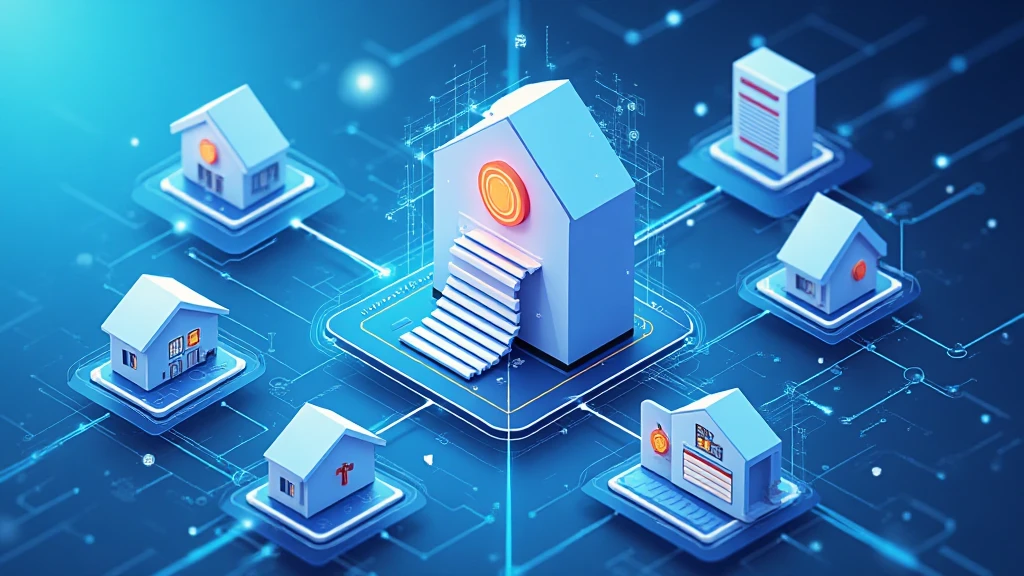Introduction
In the past few years, blockchain technology has made significant strides in revolutionizing various sectors, with real estate being one of the most impacted. According to recent data, the global blockchain in real estate market is projected to reach USD 1.4 billion by 2026, growing at a CAGR of approximately 61.9% from 2019 to 2026. As property transactions often face challenges such as fraud, lack of transparency, and inefficiencies, blockchain-based solutions have surfaced as the answer to these long-standing issues.
This article delves into the integration of blockchain technology with real estate title insurance, highlighting its benefits, challenges, and the implications it holds for the market in Vietnam.
Understanding Blockchain and Real Estate Title Insurance
At its core, blockchain is a decentralized ledger technology that securely records transactions across multiple computers so that the recorded transactions cannot be altered retroactively. This concept applies to real estate title insurance, which protects property buyers from disputes over title ownership and ensures that their investment is secure.

The Integration of Blockchain in Title Insurance
Blockchain technology enhances the title insurance process by providing a secure and transparent way to verify ownership history and ownership rights. Here’s how:
- Immutable Records: Once recorded on the blockchain, ownership records are immutable, giving buyers and insurers confidence that the information is accurate.
- Transparency and Accessibility: Blockchain allows all stakeholders to access the ownership records, ensuring a transparent process.
- Efficiency: By enabling real-time updates, blockchain streamlines the process of transferring titles, reducing the time and cost associated with traditional title insurance.
- Fraud Prevention: The use of cryptographic signatures and decentralized validation helps in preventing fraudulent claims related to property ownership.
Benefits of Blockchain Real Estate Title Insurance
The benefits of adopting blockchain technology in real estate title insurance are vast. Let’s explore them in detail:
1. Enhanced Security
Blockchain technology provides unparalleled security due to its decentralized nature. Each transaction involves a consensus among participating nodes, making it extremely difficult for malicious actors to manipulate data. This characteristic is critical in protecting title insurance against fraud.
2. Cost Reduction
According to a report from the World Economic Forum, adopting blockchain could reduce real estate transaction costs by up to 10% by minimizing the need for intermediaries. This is a significant advantage for buyers and sellers alike.
3. Increased Trust
With immutable records and transparent access to ownership histories, trust among stakeholders is significantly improved. Buyers can rest assured about their investments, and sellers can confidently transfer ownership without disputes.
4. Streamlined Processes
Traditional title insurance processes can be lengthy and cumbersome, involving multiple parties and documentation. Blockchain streamlines these processes by automating various functions like title searches and documenting ownership transfers.
Challenges and Limitations
While the potential of blockchain in real estate title insurance is promising, there are challenges that need consideration:
1. Regulatory Uncertainty
Regulations surrounding blockchain technology in real estate are still evolving. Governments worldwide, including Vietnam, are working to establish rules that complement this innovation while ensuring consumer protection.
2. Integration with Existing Systems
Transitioning to a blockchain-based title insurance model requires integration with existing systems and databases. This can be a complex and costly endeavor for many companies.
3. Technology Adoption
Stakeholders in the real estate market must be educated about blockchain technology to foster acceptance. This often involves training and awareness initiatives to help mitigate skepticism.
Vietnam’s Response to Blockchain Real Estate Title Insurance
Vietnam’s real estate market is witnessing a boom, fueled by its robust economic growth and increasing foreign investment. As of 2023, Vietnam has recorded a significant growth rate of over 20% in its real estate market largely due to its youth demographic and urbanization. The adoption of blockchain technology in this sector could further enhance trust and security.
Regulatory Developments
The Vietnamese government has begun to recognize the importance of blockchain in enhancing property transactions. Various regulatory initiatives are unfolding to enable the legal use of blockchain for real estate title insurance, thus encouraging greater participation from both local and international stakeholders.
Local Market Adoption
Innovative companies within Vietnam are already exploring blockchain applications in real estate. They are developing pilot projects and initiatives aimed at demonstrating the efficacy of blockchain in improving title insurance processes.
Case Studies of Blockchain Implementation in Title Insurance
Various projects worldwide have successfully implemented blockchain technology in title insurance, and some insights can be drawn from these implementations:
- Propy: An international real estate transaction platform using blockchain to allow users to buy properties remotely by providing secure and transparent transactions.
- Uphold: A project focusing on property ownership and title verification through blockchain technology to ensure both parties’ interests are safeguarded.
The Future of Blockchain in Real Estate Title Insurance
As blockchain technology continues to mature and regulatory frameworks evolve, we can expect to see a significant uptake across the real estate industry. Here’s what we might anticipate in the coming years:
1. Wider Acceptance
With growing awareness among stakeholders and advancements in technology, we can expect higher adoption rates of blockchain solutions in real estate, fostering a more secure and efficient environment.
2. Increased Investment
Investors will likely channel their funds into blockchain-based real estate projects, contributing to a surge in innovation and development.
3. Enhanced Consumer Confidence
As more successful implementations are documented, consumer confidence will increase, leading to greater participation in the real estate market.
Conclusion
The integration of blockchain technology in real estate title insurance presents an innovative solution to many challenges that have plagued the industry for years. With robust benefits such as enhanced security, cost reduction, and improved trustworthiness, blockchain can play a transformative role in the real estate market.
Vietnam’s proactive approach to exploring this technology, alongside its rapidly growing real estate sector, positions it as an exciting landscape for blockchain innovation. As we move towards a more digitized future, the collaboration between technology and real estate will pave the way for a more secure and efficient pathway for property ownership.
In summary, as blockchain continues to reshape the landscape of real estate title insurance, it is essential for stakeholders in Vietnam and beyond to seize this opportunity for enhanced security and trust in property transactions.
officialcryptonews – Stay updated with the latest insights into cryptocurrency and digital asset innovations.




